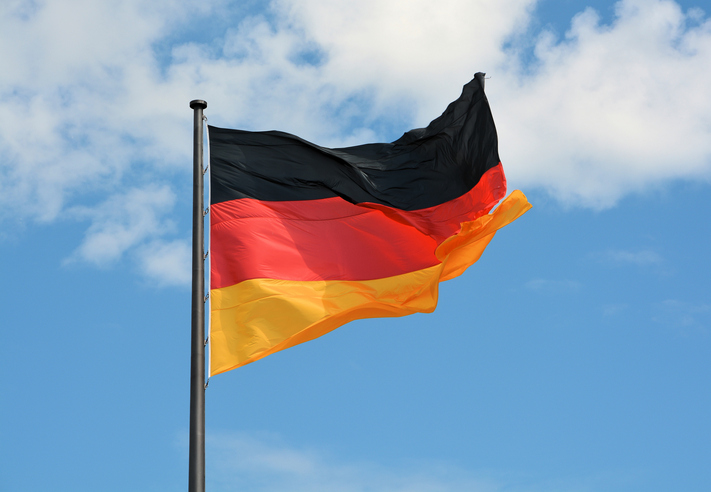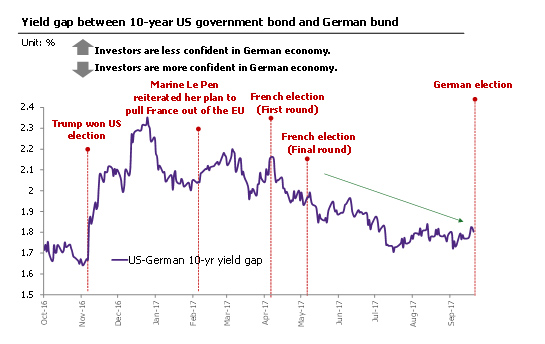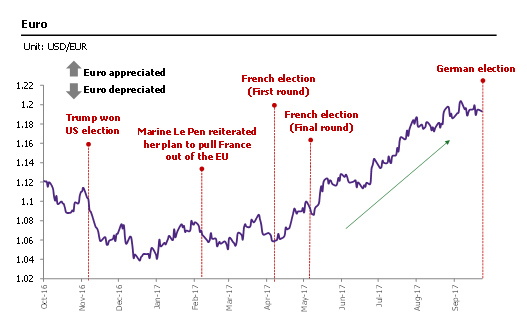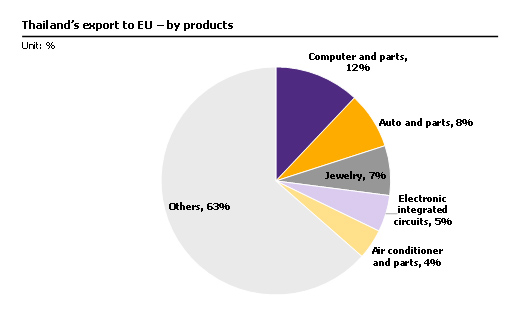- The expected turnout of German election will help reinforce confidence and promote growth in the EU economy in 2017. Angela Merkel’s victory supports a positive outlook towards the EU, lessening concerns over anti-establishment sentiment in Europe’s largest economy. Moreover, this will ensure that the momentum of EU reform will be carried forward. In this regard, EIC believes that these factors will contribute positively to the Eurozone economy, hiking its growth to 1.9% in 2017 from 1.7% in 2016. This will also have positive impact on Thai exports to the EU, the market that accounts for 12% of Thailand’s exports. Major Thai exports to the EU include computers and parts, auto and parts, and jewelries.
- EU reform will determine the EU’s future. The major risk for the Eurozone economy in 2017 is the general elections of the major member countries, including Germany, France, the Netherlands, and the UK amidst the escalating popularity of anti-EU political parties and anti-establishment sentiment around the world. However, the election results have proved that the majority of voters remain hopeful in the prospects of the EU, entrusting the pro-EU leaders the control of their parliaments in the next four years. However, these next four years will prove challenging for the pro-EU leaders. If they manage to restore popular confidence, it will help improve the security of the Union. Or else, in the event of reform failure or social disruptions, e.g. immigration problems or Greece’s debt crisis, the future of EU and its common currency will be at serious risk.
- On the Watch: Italy’s election of 2018. Apart from Brexit, another political risk for the EU is Italy’s election that will take place in May 2018. The pre-election polls in September suggest that the anti-EU party of 5-Star Movement (M5S) is leading in popularity at 27.6%, while the popularity of the party PD of the former Prime Minister Matteo Renzi has dropped to 26.8%4. Italy's chronic economic stagnation, particularly in the banking sector, has boosted the popularity of M5S. If M5S manages to win the majority of the votes and form an administration, a Brexit-like referendum to leave the EU is likely.
1 The Single Market principle is based on free movement of goods, services, capital, and people.
2 If the two parties fail to reach an agreement by March 2019, trade relations between the UK and EU will be determined by WTO terms.
2 The Single Market principle is based on free movement of goods, services, capital, and people.
3 If the two parties fail to reach an agreement by March 2019, trade relations between the UK and EU will be determined by WTO terms.
4According to Wikipedia.
|
|
Figure 1 and 2: Increasing investor confidence in the Eurozone and German economy since the final round of French presidential election
![flash_en01.jpg]()
![flash_en02.jpg]()
Source: EIC analysis based on data from Bloomberg
Figure 3: computers, computer parts, automobiles and auto parts as Thailand’s main exports to the EU and the UK
![flash_en03.jpg]()
Source: EIC analysis based on data from Ministry of Commerce
|



